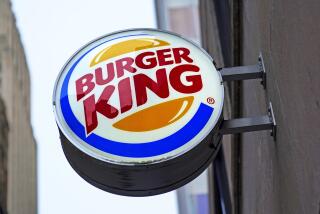Yogurt maker sued for claims
Trish Wiener believes Dannon misled her, and she wants to milk it for all it’s worth.
In a lawsuit filed Wednesday in U.S. District Court in Los Angeles, she accuses the yogurt maker of a “massive and comprehensive” false advertising campaign for its Activia, Activia Light and DanActive products.
Dannon promotes them as clinically proven to help regulate digestion and boost immunity because they contain bacteria that Wiener’s suit says aren’t so special.
“You’re hearing these scientific terms and you’re thinking that they have come up with something,” said the Northridge resident, who owns a catering company. “But the only effect that it had on me was that it tasted poorly.”
The suit seeks class-action status and demands that Dannon give refunds to everyone in the U.S. who purchased the products -- an amount that a lawyer for Wiener said could be as much as $300 million.
“Companies are getting more and more aggressive in their advertising claims. They end up playing off people’s general fears and concerns,” said the lawyer, Tim Blood, with the San Diego firm Coughlin Stoia.
Dannon was able to charge 30% more for Activia and DanActive because of its misleading campaign, Blood said, which means Wiener suffered an “economic injury.” Wiener bought the yogurt after seeing the ads and spent “more money” than she otherwise would have, he said.
A spokesman for Dannon, a unit of France’s Groupe Danone, said that the company wasn’t aware of the suit and that it stood by its claims for its products “and the clinical studies which support them.”
Wiener described herself as extremely health-conscious and said she bought Activia and DanActive to help her digestive system work smoothly. They didn’t, she said. So when a neighbor whose mother is a lawyer asked if she would be interested in pursuing a legal claim, she said she would.
“I don’t have time to research everything,” she said. “I have to go off the assumption that what I’ve been told or am reading is what’s true.”
Her suit was filed days after Merck & Co. and Schering-Plough Corp. pulled their “two sources” TV ads for Vytorin. The drug makers have been under fire since a study revealed that Vytorin didn’t reduce the buildup of fatty plaque in arteries as claimed. The study, completed in 2006, wasn’t released by the companies for 21 months.
Dannon began marketing Activia and its “bifidus regularis” bacteria in early 2006. In one ad a woman recommending the product to a friend to reduce bloating, suggesting that she try it once a day for two weeks and telling her “it works or it’s free.” A year later, Dannon launched DanActive, which it said contained “L. casai immunitas,” and was clinically proven to help improve the body’s immune system.
Sales of Activia grew 48% to $181.3 million in a year and DanActive sales rose 185% to $60 million, according to the trade magazine Brandweek.
Wiener’s suit says Dannon’s marketing department invented the words “immunitas” and “regularis” and used them because “these names sound scientific.”
Class-action suits should be filed when a company makes a scientific claim that is false, said Michael Mallow, a lawyer with Loeb & Loeb in L.A. who hadn’t seen the Dannon lawsuit. But “with any industry where there’s lots of money at stake, there is a commercial enterprise for lawyers tied to consumer class actions.”
--
More to Read
Inside the business of entertainment
The Wide Shot brings you news, analysis and insights on everything from streaming wars to production — and what it all means for the future.
You may occasionally receive promotional content from the Los Angeles Times.









